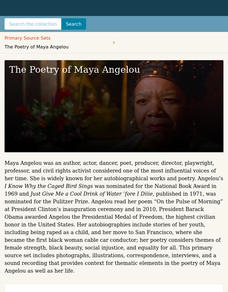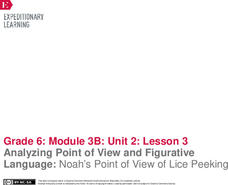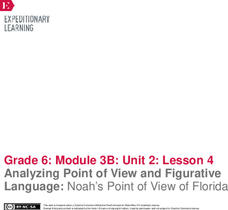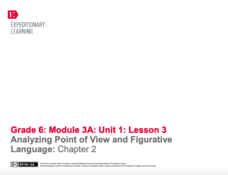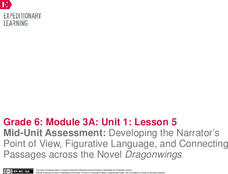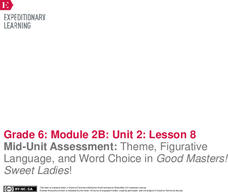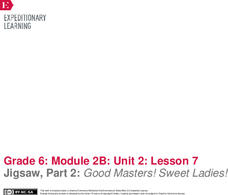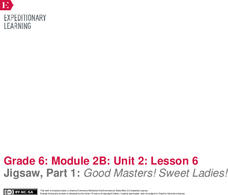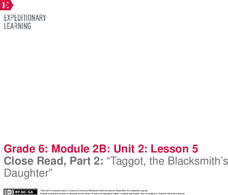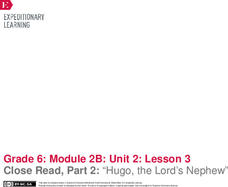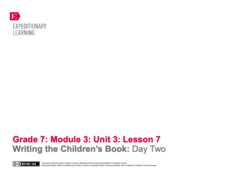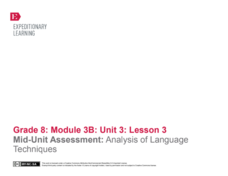Digital Public Library of America
The Poetry of Maya Angelou
Maya Angelou's work reflects her passion for life, civil rights, and justice for all. A collection of 12 primary sources provide scholars with insight into this amazing woman. The set includes photographs, articles, recordings of...
EngageNY
Analyzing Point of View and Figurative Language: Noah’s Point of View of Lice Peeking
Read along with me. Two learners read the parts of Noah and Lice in Flush as the rest of the class follows along. Readers look for unfamiliar words and the use of figurative language in the text. They complete graphic organizers and...
EngageNY
Analyzing Point of View and Figurative Language: Noah’s Point of View of Florida
Fishing for words. Scholars search for unfamiliar words in pages 27-29 of Flush, place them in their word catchers, and complete part of Noah’s Point of View graphic organizer. After identifying figurative language, learners analyze...
EngageNY
End of Unit Assessment: Finding Evidence of Laurence Yep’s Perspective on Being Chinese in Dragonwings and Determining Connotative Language
There's a fine line between reality and fiction. As an end-of-unit assessment, scholars complete worksheets to analyze how Laurence Yep's perspective on being Chinese factors into his novel Dragonwings. Next, pupils engage in a...
EngageNY
Analyzing Point of View and Figurative Language: Chapter 3
Get to the point ... the point of view, that is! Pupils analyze Laurence Yep's Dragonwings for tone, figurative language, and point of view by completing graphic organizers. Scholars also read an excerpt from the novel and record...
EngageNY
Analyzing Point of View and Figurative Language: Chapter 2
Just get to the gist. Scholars work in pairs to find the gist of an excerpt from Laurence Yep's Dragonwings. Pupils also complete graphic organizers to analyze the text for tone, point of view, and figurative language.
EngageNY
Mid-Unit Assessment: Developing the Narrator’s Point of View, Figurative Language, and Connecting Passages across the Novel Dragonwings
Let's get creative! As part of a mid-unit assessment, scholars create a piece of artwork illustrating the theme from Laurence Yep's novel, Dragonwings. Additionally, pupils use a graphic organizer to identify figurative language in...
EngageNY
Analyzing Point of View and Figurative Language: Chapter 1
Check out the view! Scholars complete a graphic organizer to analyze how Laurence Yep develops a character's point of view in Dragonwings. Additionally, pupils re-read parts of the novel and annotate the text on sticky notes, looking for...
EngageNY
Mid-Unit Assessment: Theme, Figurative Language, and Word Choice in Good Masters! Sweet Ladies!
Time to show what you know. Scholars complete a mid-unit assessment to demonstrate their learning from the past lessons. Learners work independently to identify the theme and answer questions about Pask, the Runaway. They also examine...
EngageNY
Jigsaw, Part 2: Good Masters! Sweet Ladies!
Three heads are better than one. Scholars gather back in their triads for another read of their monologues. They answer text-dependent questions and review their work. Learners then present their jigsaw monologues to the rest of the...
EngageNY
Jigsaw, Part 1: Good Masters! Sweet Ladies!
Complete a puzzle one piece at a time. Scholars gather in triads to complete jigsaw activities over a monologue from Good Masters! Sweet Ladies. They read as a group and independently and use sticky notes to identify the gist of...
EngageNY
Close Read, Part 2: “Taggot, the Blacksmith’s Daughter”
It is just a figure of speech. Readers look for figurative language as they read Taggot, the Blacksmith’s Daughter. They complete a Figurative Language graphic organizer by recording and identifying the types of figurative...
EngageNY
Close Read, Part 2: “Hugo, the Lord’s Nephew”
No, not literally. Scholars read Hugo, the Lord’s Nephew to compare figurative and literal language. Readers learn about simile, metaphor, personification, and idioms with a graphic organizer. Pupils then answer text-dependent...
EngageNY
Analyzing Text Structure: “Water Is Life” Paragraphs
Water, water everywhere. Readers revisit paragraphs six through nine in the article "Water is Life" to answer text-dependent questions. They then pair up to reread the article focusing on its structure and record their thoughts on...
EngageNY
Close Reading: Paragraphs 1–5 of “Water Is Life”
Be more specific. Scholars take a look at domain-specific vocabulary by discussing an anchor chart. They then look at vocabulary words recorded from paragraphs one through five in Water of Life. After analyzing the vocabulary used in the...
EngageNY
Mid-Unit Assessment, Part 2: Analyzing an Excerpt from the Narrative
Writing is a craft. Scholars take a mid-unit assessment where they answer questions about the author's purpose and craft in Douglass's narrative. After completing the assessment, pupils look continue with their independent reading text.
EngageNY
Understanding Douglass’s Words: An Escape Attempt
Make a match! Scholars play a matching game after looking at excerpt five from Narrative of the Life of Frederick
Douglass. Learners match types of figurative language with example sentences, and add to their powerful language word wall...
EngageNY
Analyzing Douglass’s Purpose: Excerpt 4
Anchors away! Scholars take a look at the Group Work anchor chart to prepare for the excerpt four, The Fight with Covey, analysis. The Excerpt 4 Analysis note catcher guides the group as they carry out their analyses. The class...
EngageNY
Writing the Children’s Book: Day Two
Following a brief mini-lesson on using dialogue in fiction, young writers continue day two of their writing workshop. They work on the second half of their Children's Book Storyboards, and then they turn and talk with partners to reflect...
EngageNY
Analyzing Word Choice: Understanding Working Conditions in the Mills
Ravenous or hungry, happy or ecstatic—why does word choice matter? Scholars continue to analyze working conditions in the mill and how the conditions affect the protagonist of Katherine Paterson's novel, Lyddie. They engage in a close...
EngageNY
Mid-Unit Assessment: Analysis of Language Techniques
Show what you know. Learners demonstrate mastery of English grammar and usage by completing a pen-and-paper assessment of verbals and verb shifts. In addition, they begin composing a book review based on an independent reading book. The...
EngageNY
Launching the Performance Task
This word or that, this picture or that. Individuals dive into the lives of The Little Rock Nine and the connotation used in the book A Mighty Long Way as they begin the performance task. The task scenario establishes literature lovers...
EngageNY
Character Analysis: Resilience
A Three Threes in a Row note catcher enables class members to dig deeper into the theme in Unbroken. They work with partners for 10 minutes and then rotate around the room to work with others. After regrouping and class discussion,...
EngageNY
Introducing a Thematic Concept in This Unit: The “Invisibility” of Captives during WWII (pages 170-181)
Scholars discuss the phrase identity is erased and how it relates to the theme of invisibility. They use their Understanding Invisibility note catcher to identify how invisibility may occur within a person. They then work on a Gathering...


